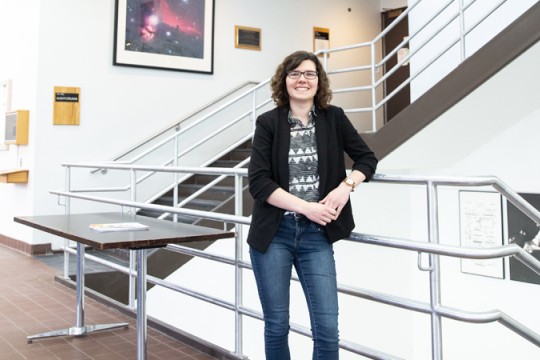News
Christopher Kanan
-
January 31, 2022
![student wearing sensors on her head adjusts a robotic arm.]()
AI research collaboration begins
Cecilia Alm, an associate professor in RIT’s College of Liberal Arts, was awarded nearly $2 million by the National Science Foundation to lead a team of RIT faculty addressing a lack of diversity in the artificial intelligence research community and gaps in AI curricula.
-
January 31, 2022
![logo for the National Science Foundation.]()
Scholars earn coveted early career awards
Three faculty members who chose to start their research careers at RIT received prestigious National Science Foundation CAREER Awards in 2021. Their research aims to advance the foundations of machine intelligence, artificial intelligence, and clean energy.
-
September 21, 2021
![student making adjustments to a robotic arm.]()
RIT awarded nearly $2 million for NSF Research Traineeship Program, AWARE-AI
To help address a lack of diversity, as well as gaps in AI curricula, RIT was awarded a grant of nearly $2 million by the NSF to create a new research traineeship program for graduate students
-
September 16, 2021
![professor talking with student in a lab.]()
Christopher Kanan earns NSF CAREER Award to develop brain-inspired AI systems
Christopher Kanan, an associate professor in the Chester F. Carlson Center for Imaging Science, received an NSF Faculty Early Career Development (CAREER) award and grant for his five-year project to expand the capabilities of artificial intelligence systems using new brain-inspired methods.
-
March 23, 2021
![scene from the video game Starcraft.]()
New AI from RIT researchers can play Starcraft II; project is DARPA-funded
WROC-TV talks to Christopher Kanan, assistant professor in the Chester F. Carlson Center for Imaging Science, about an artificial intelligence project.
-
March 12, 2021
![screenshot of building on fire in the video game Starcraft 2.]()
RIT researchers helping to develop artificial intelligence systems capable of playing 'Starcraft II'
A team of researchers that develops artificial intelligence systems is putting its work to a unique new test: creating machines capable of playing the popular video game Starcraft II. Researchers think it could be an important stepping stone to advancing practical solutions such as self-driving cars, service robots, and other real-world applications.
-
April 23, 2020
![researcher pointing at equations on dry-erase board.]()
Fixing the forgetting problem in artificial neural networks
An RIT scientist has been tapped by the National Science Foundation to solve a fundamental problem that plagues artificial neural networks. Christopher Kanan, an assistant professor in the Chester F. Carlson Center for Imaging Science, received $500,000 in funding to create multi-modal brain-inspired algorithms capable of learning immediately without excess forgetting.
-
April 18, 2020
![photo of Tyler Hayes in the Carlson Center at RIT]()
Student to Student: Artificial intelligence/machine learning
During an internship, Tyler Hayes used computer vision and machine learning techniques to estimate the quality of images taken from airborne image sensors. It sparked her interest to learn more about machine learning, so she applied to the Imaging Science Ph.D. program at RIT.
-
October 22, 2019
![Three researchers look at eye-tracking software on computer.]()
RIT researchers win first place in international eye-tracking challenge by Facebook Research
The team, led by three Ph.D. students from the Chester F. Carlson Center for Imaging Science, won first place in the OpenEDS Challenge focused on semantic segmentation.
-
July 10, 2019
![Google Streetview map of marsh area overlayed bt heatmap squares of yellow and orange.]()
RIT scientists using technology to fight invasive plants
City Newspaper reports on work by Assistant Professor Christopher Kanan and Associate Professor Christy Tyler, both in the College of Science.
-
June 20, 2019
![A marsh next to a roadside with green, yellow and orange blocks superimposed over plants.]()
Artificial intelligence and Google Street View could hold the key to stopping invasive plants
The New York State Department of Environmental Conservation will award two RIT faculty members a grant to map roadside infestations of five key invasive plant species in the Finger Lakes and Adirondack Park over the next two years.
-
March 6, 2019
![Three researcher watch hyperspectral camera on roof.]()
RIT researchers developing ways to use hyperspectral data for vehicle and pedestrian tracking
A classic scenario plays out in action films ranging from Baby Driver to The Italian Job: criminals evade aerial pursuit from the authorities by seamlessly blending in with other vehicles and their surroundings. The Air Force Office of Scientific Research (AFOSR) has RIT researchers utilizing hyperspectral video imaging systems that make sure it does not happen in real life.
















